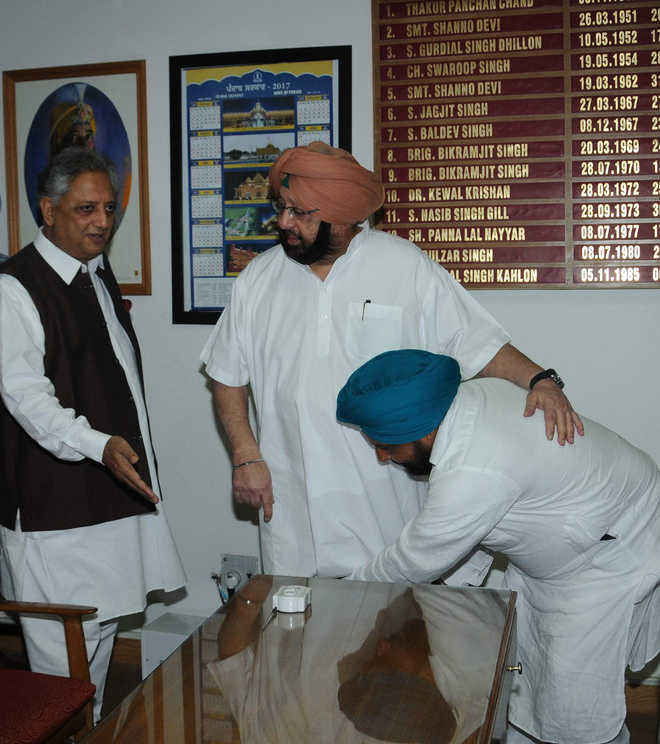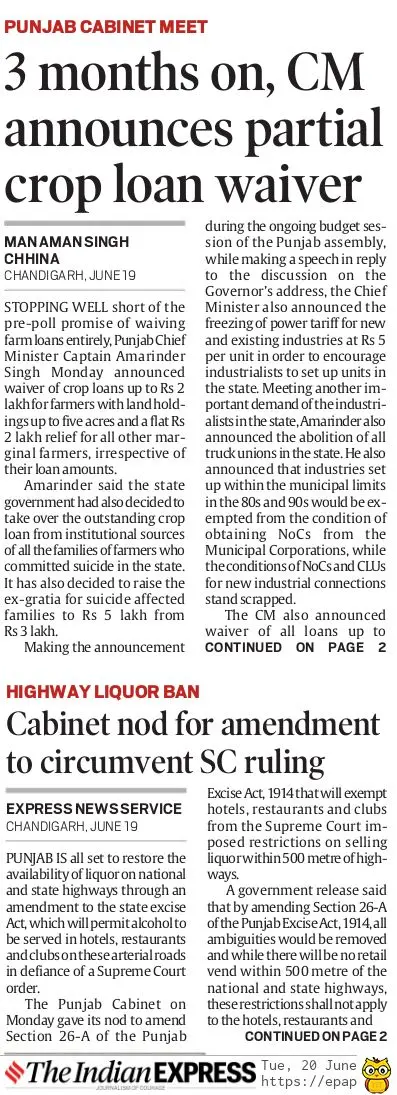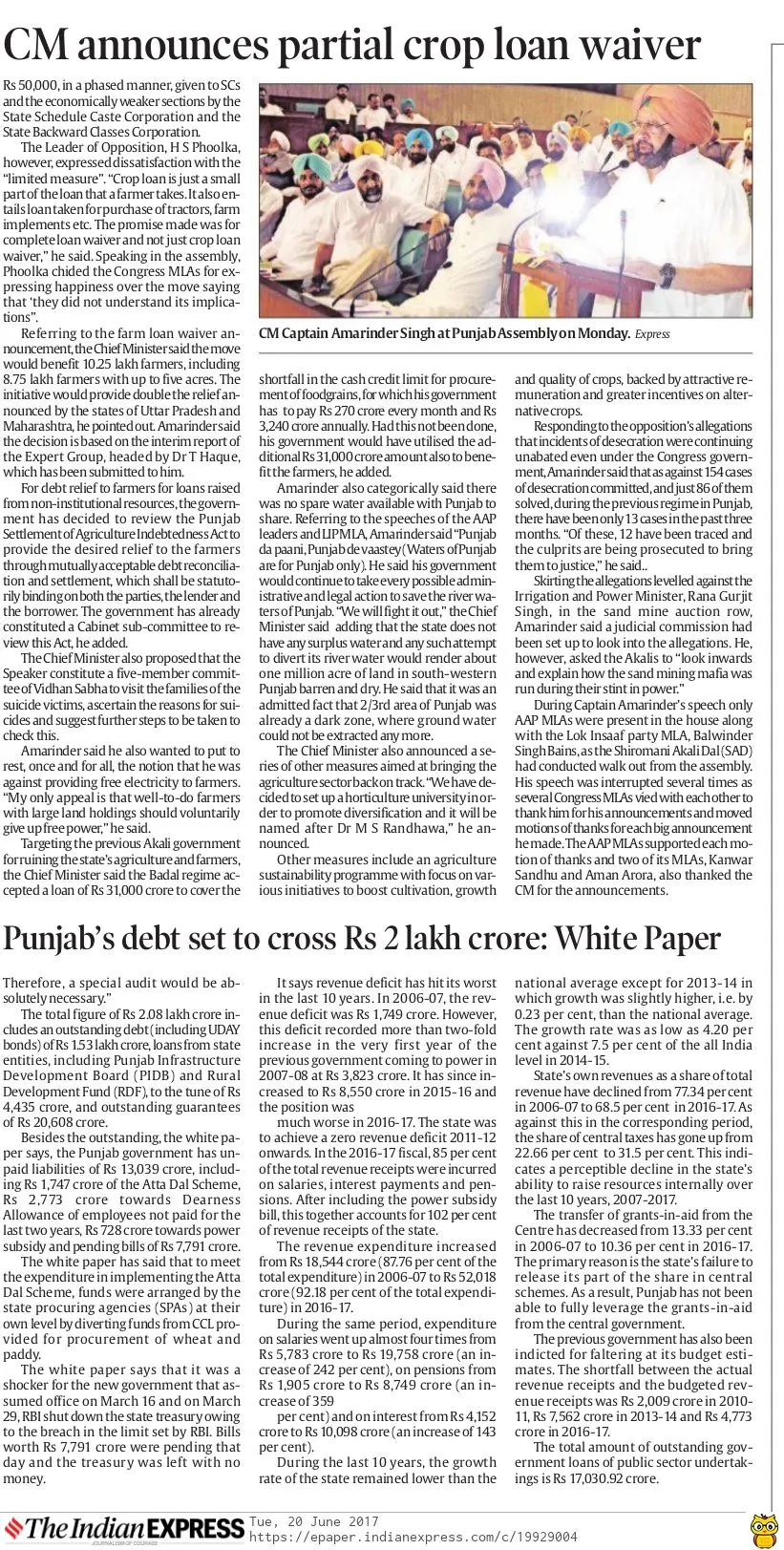Amarinder announces loan waiver bonanza for farmers
Small and marginal farmers with loans up to ₹2 lakh biggest beneficiaries; plan doesn’t cover loans extended by arhtiyas
Punjab chief minister Capt Amarinder Singh on Monday announced a total waiver of crop loans up to ₹ 2 lakh of small and marginal farmers(owning up to 5 acres), and a flat ₹2 lakh relief for all marginal farmers, irrespective of the loan amount.
The chief minister’s announcement covers cooperative loans, not loans taken by farmers from arhtiyas (private money lenders). A total of 10.25 lakh farmers are expected to benefit from the loan write-off involving a liability of ₹20,500 crore. He also announced a waiver of ₹ 50,000 for scheduled caste farmers irrespective of land holdings.
Amarinder, who made the announcement while replying to a discussion on the governor’s address, said the roadmap for waiver and total funds required would be announced by the finance minister in his budgetary proposals. “The waiver will provide double the relief announced by the states of Uttar Pradesh and Maharashtra,” he said.
The announcement is based on an interim report submitted by an expert group headed by Dr T Haque, former chairman of Commission for Agricultural Costs and Prices (CACP), set up in April 2017 to assess the quantum of debt and ways and means for its waiver. The loan-waiver promise was part of the Congress manifesto released during the assembly polls.
The CM announced to waive the entire loan of families of farmers who committed suicide in the state, besides increasing the ex gratia for suicide-affected families to ₹ 5 lakh from the existing ₹ 3 lakh.
GIVE UP POWER SUBSIDY, CM TO RICH FARMERS
Amarinder Singh, while reiterating that the free power subsidy would continue, asked the well to do farmers to give up their subsidy voluntarily.
CHANDIGARH:In a scathing indictment of fiscal management during the Akali-BJP rule of 10 years, the Congress government, in a white paper tabled in the assembly on Monday, said the state is in the “tight grip of a debt trap” and its finances in a “free fall”.

As an almost empty state treasury is a huge worry for Capt Amarinder Singh-led government, the white paper has political undertones, indicating how much to expect from the budget.
The paper puts the outstanding debt, power bonds, loans of state entities and loan to cover cash credit limit gap at ₹1.87-lakh crore, as on March 31, 2017. If the state guarantees are added, it jumps to ₹2.08-lakh crore.
“The state finances are in a free fall, as the government revenue has not kept pace with its expenditure, leading to ballooning revenue and fiscal deficits,” reads the 143-page white paper, summarising the fiscal woes. “A high percentage of expenditure is already committed, leaving hardly any fiscal space. It is inflicted with structural imbalance and, if no corrective measures are taken, it will take a heavy toll on the future development of the state.”
EMPTY TREASURY WORRIES CAPT GOVT
The paper notes that apart from meeting the day-to-day challenge of keeping the treasury afloat for the routine administrative expenditure, the state is constantly facing grave paucity of resources for financing the capital expenditure. “The situation is alarming.”
The Congress came to power with the promise of farm debt waiver, unemployment allowance, mobile phones, jobs and a lot of other cash-guzzling freebies.
While chief minister Capt Amarinder Singh announced debt write-off after the two white papers were tabled, his government lacks the financial wiggle room to implement most of its promises and is expected to stagger them.
In the past, too, the governments in states of Haryana, Tamil Nadu, Maharashtra and Kerala have presented white papers to bring out fiscal mismanagement of their predecessors and to defer or stagger implementation of their promises.
REVENUES MORTGAGED, PROPERTIES PLEDGED
Another disturbing feature of fiscal management was the Akali-BJP regime’s penchant for abusing government entities — such as Punjab Infrastructure Development Board (PIDB), Rural Development Board (RDB) and Punjab Urban Development Authority (PUDA) — to indiscriminately raise loans by mortgaging their future revenues or by hypothecating immovable properties at their disposal.
The three undertakings raised loans to the tune of ₹12,643 crore. A part of this debt also flowed into the state treasury as “informal debt”, which stands at ₹4,435 crore.
“Raising loans in this manner is nothing short of selling the family silver to run your kitchen. They provided a handy window to fund the populist programmes of the then ruling dispensation,” the white paper points out.
The loans were raised as an off-budget exercise and totally escaped due scrutiny, legislative approval and audit by the Comptroller and Auditor General (CAG) . The government has hinted at carrying out a special audit to ascertain whether the loans were properly accounted for and utilised in accordance with their statutory mandate.
GROWTH BELOW ALL-INDIA AVERAGE
The state’s financial decline, according to the paper, has seamlessly merged into its economic decline, making it one of the slow growing states of the country.
During the last 10 years, the growth rate of Punjab remained lower than the all-India average, except in 2013-14, when it was slightly higher. The growth rate was as low as 4.2% against 7.5% at all-India level in 2014-15.
The average growth of the Gross State Domestic Product (GSDP) recorded from 2006-07 to 2015-16 was 6.37%, which was lower than the average growth recorded by Goa (10.68%), Bihar (10.08%), Gujarat (9.70%), Madhya Pradesh (8.54%), Haryana (8.30%), Maharashtra (7.71%) and Tamil Nadu (7.66%). Also, the state, which held the top position in per capita income for a long time, has slid to the seventh position among the major states.
Now, free education for girls from nursery to PhD
CHANDIGARH: Chief minister Capt Amarinder Singh on Monday announced free education for girls from nursery to the doctorate level in government institutions of Punjab. He was speaking in the Vidhan Sabha.

colleges.
He also announced a pilot project to promote English in government schools from next month, besides opening of five new colleges. LOKPAL BILL: Amarinder also announced a new Lokpal Bill, which will bring not only the ministers and all bureaucrats under in its ambit, but also the CM
NO SYL CANAL: The CM reiterated his government’s stand on the Sutlej-Yamuna Link (SYL) Canal, saying he will not allow the canal to be constructed as the state had no surplus water to share with others. POWER TARIFF: Amarinder also announced a freeze on
power tariff for all consumers, including new and existing industries, at ₹5 per unit
TRUCK UNIONS: 134 unions of transporters would cease to exist. The CM said a new law to be introduced soon to give an alternative policy
GOVT CLEARS GST: The government also cleared the Punjab State Goods and Services Tax (GST) Bill, 2017. The Opposition said it would lead to price rise, while finance minister Manpreet Singh Badal said prices would fall and government earnings would rise ROAD CONNECTIVITY: Four district towns of Mansa, Muktsar, Fazilka and Ferozepur will be connected with 4 to 6 lane highways. CM to take up issue with the Centre
RAIL LINK: According to the CM, he had written to the Centre for rail connectivity between Patti and Makhu which will connect the Majha region with Malwa and then with Rajasthan
AIR CONNECTIVITY: The state government recently signed an MoU with Union ministry of civil aviation for implementing the regional connectivity scheme – UDAN, connecting four state airports — Bathinda, Ludhiana, Pathankot and Adampur — with Delhi. An aeronautical engineering college at Patiala to be will completed this year. Mohali airport to be expanded.
Rs 2 lakh waiver on loans for small, marginal farmers
Relief up for suicide victims’ kin | All truck unions disbanded | Rs 5/unit power for industry

Chief Minister Capt Amarinder Singh at the Punjab Vidhan Sabha in Chandigarh on Monday. Tribune photo: Manoj Mahajan
Rajmeet Singh
Tribune News Service
Chandigarh, June 19
Punjab Chief Minister Capt Amarinder Singh today announced a waiver of crop loans up to Rs 2 lakh for small and marginal farmers (up to 5 acres) and a flat Rs 2 lakh relief for all other marginal farmers, irrespective of their loan amount, paving the way for a total waiver of agricultural debts.Making the announcement in the Punjab Assembly, the CM said the move would benefit 10.25 lakh farmers of the state’s 18.5 lakh farming families, including 8.75 lakh farmers with land-holding up to 5 acres. “The initiative would provide double the relief announced by Uttar Pradesh and Maharashtra,” Capt Amarinder pointed out.(Follow The Tribune on Facebook; and Twitter @thetribunechd)The decision is based on the interim report of an expert group, headed by eminent economist Dr T Haque, which was tasked with suggesting ways and means to help the state’s distressed farming community. To provide relief to the families of farmers who had committed suicide, the Chief Minister said the government had decided to take over their outstanding crop loan from institutional sources and to raise ex gratia from Rs 3 lakh to Rs 5 lakh.In case of loans raised from non-institutional sources, the government has decided to review the Punjab Settlement of Agriculture Indebtedness Act to provide relief through debt reconciliation and settlement mutually acceptable to the lender and the borrower.The CM asked the Speaker to set up a five-member committee to visit families of suicide victims, ascertain the reasons for the suicides and suggest steps to prevent these. He told the Assembly that his government had already decided to repeal Section 67-A of the Punjab Cooperative Societies Act, 1961, to end auction (kurki) of farmers’ land.Meanwhile, the government has disbanded truck unions across the state. In the recent past, several Congress leaders have had bloody feuds with their rivals over wresting control of these unions.The CM also announced a freeze on power tariff for all types of industry at Rs 5 per unit — one of the poll promises of the Congress government.
CM Sets exampleThe Punjab CM appealed to well-to-do farmers to give up power subsidy voluntarily. To set an example, he announced to give up subsidy on his own farm and appealed to his colleagues to do likewise.
Other key announcements
- Skills development university at Chamkaur Sahib, Ropar
- Wellness mohalla/ward clinics, health insurance for all
- Loan waiver up to Rs 50,000 for SCs/weaker sections
- New industrial hubs to come up in Sangrur and Khanna
- New Lokpal law to cover CM, ministers and bureaucrats
- Free textbooks for nursery & LKG students in govt schools
SAD-BJP left state in fiscal mess, claims White Paper

Newly-elected Deputy Speaker Ajaib Singh Bhatti takes blessings from CM Capt Amarinder Singh on Monday. Tribune photo: Manoj Mahajan
Jupinderjit Singh
Tribune News Service
Chandigarh, June 19
The White Paper on the state’s fiscal condition tabled by the Punjab Government in the Assembly today states that the state is left with no money for development.It says against every Rs 100 earned, the expenditure is Rs 102, if all committed liabilities, including salaries, pension, interest on debt, power subsidy, are taken into account.The additional Rs 2 is raised by borrowings or by selling government property. Most alarming is the decline in capital expenditure.Against 92.18 per cent revenue expenditure the capital expenditure was just 7.82 per cent during 2016-17, which shows meagre spending on development.The state’s growth rate has been well below the national average since 2007-08 except in 2013-14. Punjab is far behind states like Bihar, Gujarat, Maharashtra, MP and Tamil Nadu. In fact, it is one of the slowest growing states in the country.The outstanding debt has risen to Rs 2,08,060.96 crore. The interest payment consumes a significant part of the revenue. The paper says the state has an unpaid liability of Rs 13,039 crore.Finance Minister Manpreet Badal claimed that Rs 1,747 crore worth of atta-dal was not given to beneficiaries, Rs 2,773 crore was not paid to the employees as dearness allowance, Rs 728 crore subsidy on power was pending and Rs 7,791 crore worth of bills were outstanding with the treasury.He accused the previous regime of indulging in smart accounting wherein the integrity of the Budgets in the last 10 years had become questionable.He announced that a special audit would be done to find out if loans raised by the government were in accordance with the norms. He termed the selling of government resources as an abuse of the system.Further accusing the previous government, Manpreet said the revenue generated by various levies was deposited in a separate corpus fund, instead of depositing the same in the Consolidated Fund of the state. The White Paper states corpus fund was spent without sanction of the Vidhan Sabha or auditing by the Comptroller Auditor General (CAG). It says the decisions were unplanned, scattered and against the constitution of these entities.
Cong now blames Centre for Rs 31,000-crore ‘food scam’
Amaninder Pal
Tribune News Service
Chandigarh, June 19
In an apparent climbdown, the Congress has pinned the fault for the Rs 31,000 crore food scam by the SAD-BJP on the faulty procurement policies of the Centre.During its poll campaign, it had dubbed it as the biggest “food scam” but the White Paper doesn’t even hint that the gap was result of any scam. Rather, it has blamed the Centre for this huge liability of the state.The only major fault that the paper could find with the previous regime was its “ineffective presentation of state’s claims” and readiness with which the government had accepted the Centre’s offer to convert liability into a loan, which the state is bound to pay for the next 20 years.Another charge is that the Akali-BJP failed to make budgetary provisions to repay the amount to the Centre. Again, the charge doesn’t suggest any scam.In a 13-page chapter ‘Liability of Cash Credit Limit’ exclusively dedicated to this crucial issue, the incumbent government traces the genesis of the problem in “the difference between actual costs incurred in procurement operations and costs reimbursable as per the Provisional Costs Sheet (PCS).”Apart from payment of MSP, procurement exercise also includes expenditures like taxes, labour charges, transportation, milling charges, administrative charges and cost of gunny bags. All such elements are part of the PCS.The document itself admits that the actual cost of procurement is invariably more than expenditure cited in the PCS.“Due to non-reimbursement of the actual expenses, the gap had been increasing due to compound interest. The government didn’t make any budgetary provision for adjustment of such a gap which was finally made in the kharif season 2015-16”, reads the White Paper.Regarding the role of the previous government, it only added that the entire burden of settlement of outstanding accounts couldn’t have been put squarely on the state government without any contribution from the Centre or banks.“However, the previous government accepted the same, burdening the citizens with a huge debt”, the paper reads.






